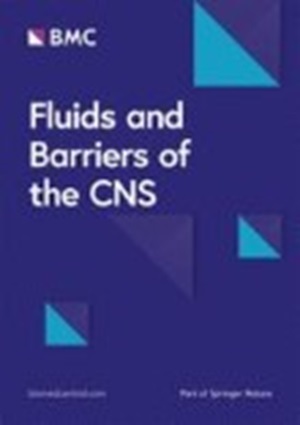Truncated mini LRP1 transports cargo from luminal to basolateral side across the blood brain barrier
IF 5.9
1区 医学
Q1 NEUROSCIENCES
引用次数: 0
Abstract
The most crucial area to focus on when thinking of novel pathways for drug delivery into the CNS is the blood brain barrier (BBB). A number of nanoparticulate formulations have been shown in earlier research to target receptors at the BBB and transport therapeutics into the CNS. However, no mechanism for CNS entrance and movement throughout the CNS parenchyma has been proposed yet. Here, the truncated mini low-density lipoprotein receptor-related protein 1 mLRP1_DIV* was presented as blood to brain transport carrier, exemplified by antibodies and immunoliposomes using a systematic approach to screen the receptor and its ligands’ route across endothelial cells in vitro. The use of mLRP1_DIV* as liposomal carrier into the CNS was validated based on internalization and transport assays across an in vitro model of the BBB using hcMEC/D3 and bEnd.3 cells. Trafficking routes of mLRP1_DIV* and corresponding cargo across endothelial cells were analyzed using immunofluorescence. Modulation of γ-secretase activity by immunoliposomes loaded with the γ-secretase modulator BB25 was investigated in co-cultures of bEnd.3 mLRP1_DIV* cells and CHO cells overexpressing human amyloid precursor protein (APP) and presenilin 1 (PSEN1). We showed that while expressed in vitro, mLRP1_DIV* transports both, antibodies and functionalized immunoliposomes from luminal to basolateral side across an in vitro model of the BBB, followed by their mLRP1_DIV* dependent release of the cargo. Importantly, functionalized liposomes loaded with the γ-secretase modulator BB25 were demonstrated to effectively reduce toxic Aß42 peptide levels after mLRP1_DIV* mediated transport across a co-cultured endothelial monolayer. Together, the data strongly suggest mLRP1_DIV* as a promising tool for drug delivery into the CNS, as it allows a straight transport of cargo from luminal to abluminal side across an endothelial monolayer and it’s release into brain parenchyma in vitro, where it exhibits its intended therapeutic effect.截短的迷你 LRP1 将货物从管腔转运至基底侧,穿越血脑屏障
在考虑向中枢神经系统输送药物的新途径时,最关键的领域是脑血屏障(BBB)。早期研究表明,许多纳米颗粒制剂都能靶向 BBB 的受体,将治疗药物输送到中枢神经系统。然而,目前还没有提出中枢神经系统入口和在中枢神经系统实质内移动的机制。在这里,研究人员提出了截短的迷你低密度脂蛋白受体相关蛋白1 mLRP1_DIV*作为血液到大脑的转运载体,以抗体和免疫脂质体为例,采用系统的方法在体外筛选受体及其配体穿过内皮细胞的路线。通过使用 hcMEC/D3 和 bEnd.3 细胞在 BBB 体外模型中进行内化和运输试验,验证了 mLRP1_DIV* 作为脂质体载体进入中枢神经系统的有效性。使用免疫荧光分析了 mLRP1_DIV* 和相应货物通过内皮细胞的运输路线。在bEnd.3 mLRP1_DIV*细胞和过表达人淀粉样前体蛋白(APP)和预淀粉样蛋白1(PSEN1)的CHO细胞的共培养物中,研究了装载有γ-分泌酶调节剂BB25的免疫脂质体对γ-分泌酶活性的调节作用。我们的研究表明,在体外表达时,mLRP1_DIV*能将抗体和功能化免疫脂质体从管腔转运到基底侧,穿过体外的 BBB 模型,然后依赖 mLRP1_DIV* 释放货物。重要的是,在 mLRP1_DIV* 介导的跨共培养内皮单层运输过程中,负载有 γ 分泌酶调节剂 BB25 的功能化脂质体被证明能有效降低毒性 Aß42 肽的水平。总之,这些数据有力地表明,mLRP1_DIV* 是一种很有前景的向中枢神经系统递送药物的工具,因为它能使货物从管腔侧直接运输到管腔侧,穿过内皮单层,并在体外释放到脑实质中,在脑实质中显示出预期的治疗效果。
本文章由计算机程序翻译,如有差异,请以英文原文为准。
求助全文
约1分钟内获得全文
求助全文
来源期刊

Fluids and Barriers of the CNS
Neuroscience-Developmental Neuroscience
CiteScore
10.70
自引率
8.20%
发文量
94
审稿时长
14 weeks
期刊介绍:
"Fluids and Barriers of the CNS" is a scholarly open access journal that specializes in the intricate world of the central nervous system's fluids and barriers, which are pivotal for the health and well-being of the human body. This journal is a peer-reviewed platform that welcomes research manuscripts exploring the full spectrum of CNS fluids and barriers, with a particular focus on their roles in both health and disease.
At the heart of this journal's interest is the cerebrospinal fluid (CSF), a vital fluid that circulates within the brain and spinal cord, playing a multifaceted role in the normal functioning of the brain and in various neurological conditions. The journal delves into the composition, circulation, and absorption of CSF, as well as its relationship with the parenchymal interstitial fluid and the neurovascular unit at the blood-brain barrier (BBB).
 求助内容:
求助内容: 应助结果提醒方式:
应助结果提醒方式:


